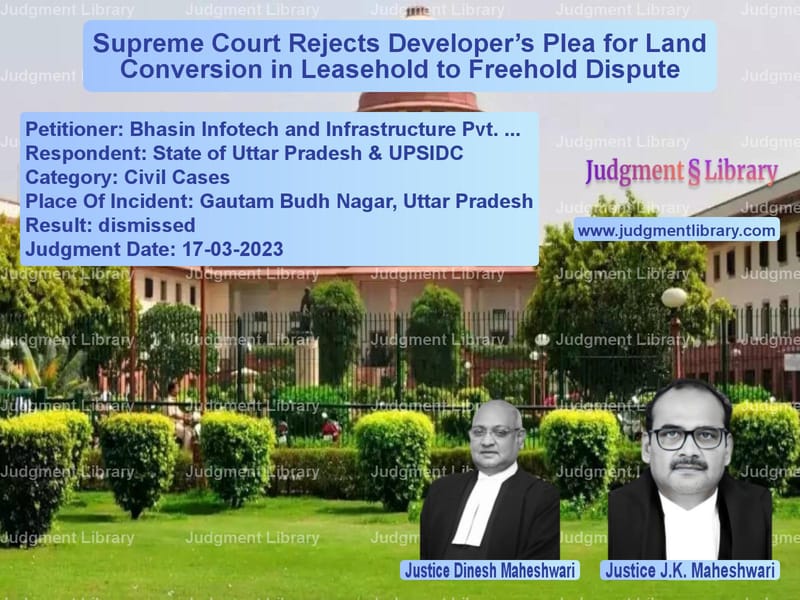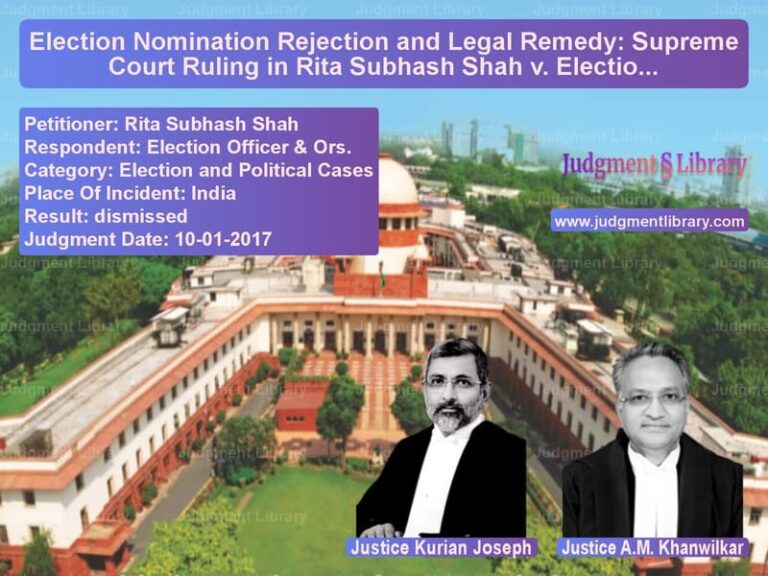Supreme Court Rejects Developer’s Plea for Land Conversion in Leasehold to Freehold Dispute
The case of Bhasin Infotech and Infrastructure Pvt. Ltd. v. State of Uttar Pradesh & Anr. revolves around the legal complexities of land ownership and development agreements. The Supreme Court was called upon to determine whether a private developer, which had leased land from the Uttar Pradesh State Industrial Development Corporation (UPSIDC), could seek its conversion from leasehold to freehold under a government policy intended to promote tourism and infrastructure.
The Supreme Court ultimately ruled against the developer, affirming that the policy in question did not apply to pre-existing projects and that the land must remain leasehold as per the original allotment terms. The decision is significant in clarifying the limitations of policy-based benefits and upholding contractual obligations in land allotment.
Background of the Case
Bhasin Infotech and Infrastructure Pvt. Ltd. (the petitioner) had been allotted a commercial plot, SH-3, in Surajpur Site-IV, Gautam Budh Nagar, Uttar Pradesh, on a 90-year lease basis. The allotment, made in 2006, allowed the company to develop a commercial complex, later known as ‘Grand Venice Mall.’
The company sought to have the land converted from leasehold to freehold based on a 2013 policy that was later amended in 2016. This policy was designed to promote tourism by offering incentives to developers establishing amusement parks, theme parks, and tourism-related projects.
When the Uttar Pradesh government rejected its application for freehold conversion, the developer challenged the decision, arguing that its project qualified for policy benefits.
Arguments by the Parties
Arguments by the Petitioner (Bhasin Infotech and Infrastructure Pvt. Ltd.)
- The petitioner claimed that its commercial complex should be recognized as a theme-based mall under the government policy and, therefore, should be eligible for freehold conversion.
- It argued that a government committee had already recommended its project for inclusion under the 2016 policy.
- The developer stated that converting the land to freehold would enhance investor confidence and generate employment.
- The refusal to grant freehold status was arbitrary, especially when similar projects had been granted benefits.
Arguments by the Respondents (State of Uttar Pradesh & UPSIDC)
- The state government contended that the policy was meant for new projects, not pre-existing ones.
- UPSIDC maintained that the original allotment conditions specified leasehold status for 90 years, and the developer had agreed to these terms.
- The policy required a minimum 20% partnership by a public sector entity, which was absent in the petitioner’s project.
- The state had never approved freehold conversion for any similar UPSIDC projects, and making an exception would set a problematic precedent.
Supreme Court’s Legal Analysis
Interpretation of the 2013 and 2016 Policies
The Supreme Court analyzed whether the petitioner’s project fell within the purview of the policies formulated in 2013 and amended in 2016. The Court observed:
“The policy in question was intended to encourage new tourism-related developments, particularly those meeting specific investment and infrastructure requirements. The petitioner’s project was conceptualized and partially completed before the policy was introduced.”
Enforceability of Lease Conditions
The Court upheld the lease terms, emphasizing that a lessee cannot unilaterally alter contractual obligations. It ruled:
“When land is allotted under a leasehold agreement, the lessee is bound by its terms. The petitioner cannot claim freehold rights when the original contract explicitly states otherwise.”
Rejection of Policy-Based Claims
The Supreme Court dismissed the argument that policy amendments should be retroactively applied, holding that:
“A policy cannot override pre-existing legal agreements, especially when it is designed for a different set of beneficiaries.”
Final Judgment by the Supreme Court
The Supreme Court ruled:
- The policy did not apply to the petitioner’s pre-existing project.
- The original leasehold conditions remained binding.
- The petitioner’s demand for freehold conversion was rejected.
- The government’s decision to refuse freehold conversion was legally valid and did not warrant judicial interference.
Impact of the Judgment
The ruling has significant implications for real estate developers and land policy in India:
- Reaffirms the binding nature of leasehold agreements: Developers cannot seek unilateral changes in land tenure.
- Clarifies the application of government policies: Benefits meant for new projects cannot be extended to pre-existing ones.
- Strengthens governance in land administration: Prevents misuse of policy frameworks for retrospective benefits.
Conclusion
The Supreme Court’s decision in Bhasin Infotech and Infrastructure Pvt. Ltd. v. State of Uttar Pradesh reinforces the principle that legal agreements cannot be altered based on policy changes. The ruling ensures that land tenure policies are applied consistently and prevents retrospective claims that could disrupt contractual obligations.
Petitioner Name: Bhasin Infotech and Infrastructure Pvt. Ltd..Respondent Name: State of Uttar Pradesh & UPSIDC.Judgment By: Justice Dinesh Maheshwari, Justice J.K. Maheshwari.Place Of Incident: Gautam Budh Nagar, Uttar Pradesh.Judgment Date: 17-03-2023.
Don’t miss out on the full details! Download the complete judgment in PDF format below and gain valuable insights instantly!
Download Judgment: bhasin-infotech-and-vs-state-of-uttar-prade-supreme-court-of-india-judgment-dated-17-03-2023.pdf
Directly Download Judgment: Directly download this Judgment
See all petitions in Property Disputes
See all petitions in Contract Disputes
See all petitions in Judgment by Dinesh Maheshwari
See all petitions in Judgment by J.K. Maheshwari
See all petitions in dismissed
See all petitions in supreme court of India judgments March 2023
See all petitions in 2023 judgments
See all posts in Civil Cases Category
See all allowed petitions in Civil Cases Category
See all Dismissed petitions in Civil Cases Category
See all partially allowed petitions in Civil Cases Category







